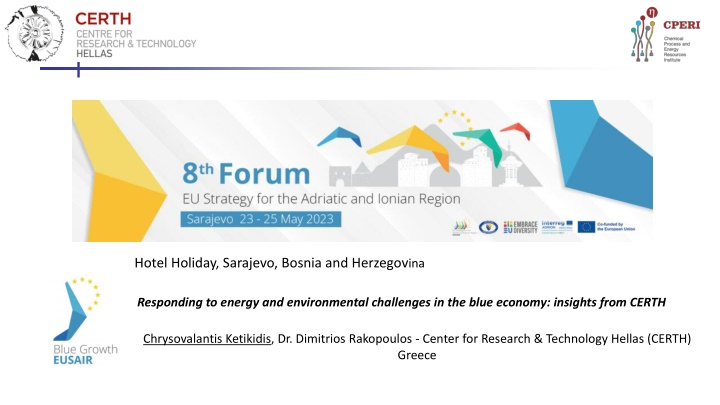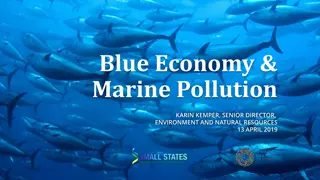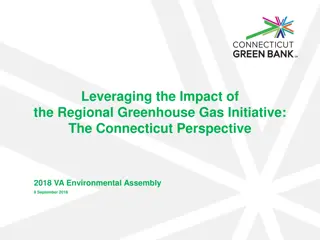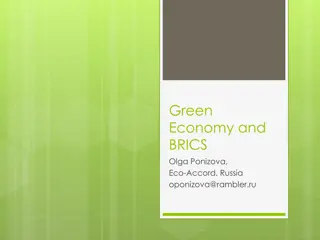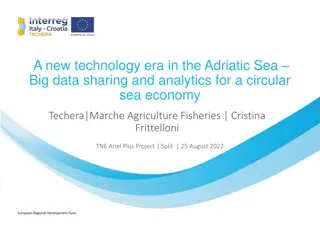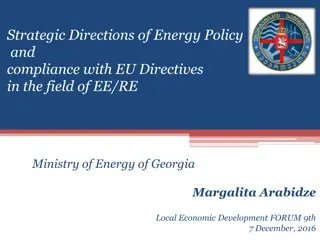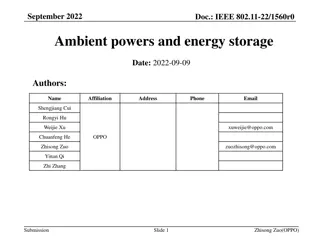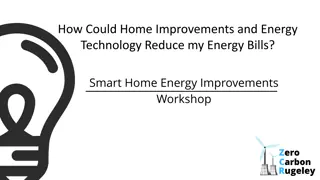Energy and Environmental Challenges in Blue Economy: Insights from CERTH
Hotel Holiday in Sarajevo, Bosnia and Herzegovina is responding to energy and environmental challenges in the blue economy. This includes a study on the certification and inspection of fishing vessels' propulsion engines. The study focuses on ensuring reliable power values for sustainable marine resource management. CERTH from Greece has been assigned to elaborate a roadmap for this certification process, aiming to facilitate compliance with fishing capacity regulations during energy transition and capacity reallocation.
Download Presentation

Please find below an Image/Link to download the presentation.
The content on the website is provided AS IS for your information and personal use only. It may not be sold, licensed, or shared on other websites without obtaining consent from the author.If you encounter any issues during the download, it is possible that the publisher has removed the file from their server.
You are allowed to download the files provided on this website for personal or commercial use, subject to the condition that they are used lawfully. All files are the property of their respective owners.
The content on the website is provided AS IS for your information and personal use only. It may not be sold, licensed, or shared on other websites without obtaining consent from the author.
E N D
Presentation Transcript
Hotel Holiday, Sarajevo, Bosnia and Herzegovina Responding to energy and environmental challenges in the blue economy: insights from CERTH Chrysovalantis Ketikidis, Dr. Dimitrios Rakopoulos - Center for Research & Technology Hellas (CERTH) Greece
Roadmap elaboration about the certification and physical inspection for the verification of fishing vessels' propulsion engines power, pursuant to Regulation (EC) no. 1224/2009 and Implementing Regulation (EU) no. 404/2011 Study for Directorate of fishing activity and product control, Directorate General of fisheries, Ministry of Rural Development and Food (Greece), November 2020
Rationale of the study: Engine power (in kW) of fishing vessels is one of the measures used to control fishing effort and to determine the fleet size of European fishing fleets towards sustainable management of marine resources. The Council Regulation (EC) No 1224/2009 and the Commission Implementing Regulation (EU) No 404/2011 set out the main responsibilities of Member States (MS) for the monitoring, certification and verification of engine power of fishing vessels. All MS have to ensure that the total capacity corresponding to the fishing licenses issued, in GT and kW, shall not be higher than the maximum capacity levels established for each MS, so it is essential that the registered power values are reliable. Given the deeply technical nature of this issue, the Greek Competent Authority for fisheries assigned CERTH, as having technical expertise among others in internal combustion engines, to elaborate a Roadmap about the certification and physical inspection for the verification of fishing vessels' propulsion engines power. 3
Scope of the study: Twofold action plan 1. Technical guidelines and details for certifying and verifying fishing vessels propulsion engines according to best available technologies and state-of-the-art techniques and based on country s peculiarities: Technical description and cost estimation of certification and physical inspections for verification Review of national and international standards pertaining to these methods and procedures 2. Detailed mapping of the whole landscape of the competent authorities, involved bodies and potential beneficiaries, with detailed description of the action plan of each: Description of the requirements and procedures of accreditation by the National Accreditation Body of the Certification Bodies that will be entitled to certify and verify the fishing engines Review of national and international standards pertaining to these accreditation methods and procedures Delivery of a rigorous roadmap about the steps that the Greek Competent Authority should follow in order to fulfill the national obligation under discussion Relevance to Blue growth: CERTH s know-how on both specialized engine-related technical and regulatory/organizational aspects for engine power certification and verification methods can facilitate fishing capacity ceiling abidance during vessels energy transition and capacity reallocation. 4
SEADRION Fostering diffusion of Heating & Cooling technologies using the seawater pump in the Adriatic-Ionian Region Rationale/Objective: Following the EU Green Deal initiative, and in order to achieve the decarbonisation of Europe s industry, heat pumps will play a key part in making Europe climate-neutral in the future. In this context, heating and cooling of buildings can be significantly reduced with technologies, which use renewable energy sources and have high efficiency. he SEADRION project aims to support the development of a regional innovation system for the Adriatic-Ionian area with the installation of 3 renewable energy facilities in public buildings located in Greece (Alexandroupolis) and the western and south part of Adriatic Croatia (Crikvenica and Dubrovnik). These facilities are seawater heat pumps, an innovative system that uses the thermal energy contained in a reservoir (sea) to achieve the cooling and thermal energy in the buildings which are close to the sea. The main objective of the SEADRION is to identify benefits and barriers associated with the use of this technology and to find a system solution designed to improve the use of the seawater heat pump (SWHP) technology and to make the building's energy self-sufficient and independent of fossil fuels. The main outputs of the SEADRION project are transnational seawater heat pump network to support sustainable development in ADRION region, science and technology cooperation between research institutions and enterprises, to enhance the innovation capacity of the heat pump sector to enhance their innovation skills, capacities and competencies and common strategy to enhance the use of seawater heat pump based heating and cooling in ADRION region. 5
Pilot plant implementation in Greece Scope Mid-2014 the Commission launched the EU strategy for the Adriatic and Ionian region (EUSAIR). It mainly revolves around the opportunities of the maritime economy Blue Growth, land-sea transport, energy connectivity, protecting the marine environment and sustainable tourism- sectors that are bound to play a crucial role in creating jobs and boosting economic growth in the region. Grouting works and sensors installation in extraction (above) and rejection boreholes (below) Blue Growth is one of the pillars elaborated in the Seadrion Blue Growth Strategy, some of which are the objectives to promote research, innovation and business opportunities in blue economy sectors, by facilitating the brain circulation between research and business communities and increasing their networking and clustering capacity as well as to improve sea basin governance, by enhancing administrative and institutional capacities in the area of maritime governance and services. Based on difficulties encountered during the implementation of the SEADRION project, many recommendations have been proposed for further progress and understanding of the EU strategy for the Adriatic-Ionian region, and thus the Blue Growth pillar, such as developing awareness and capacities through e.g. knowledge sharing platforms, building bridges and collaborations with and among involved stakeholders, etc. Heat exchanger, filters and circulation pump (primary loop) 6
Blue Growth Strategy for Ionian Adriatic Region The document elaborates the potential of seawater heat pumps as part of the Blue Growth pillar and identifies areas (access to finance, technological infrastructure, labour market and employment, awareness and knowledge, cooperation among stakeholders, legal framework) where there is potential for increased Blue Growth, including obstacles that may be encountered as well as possible interventions to solve them. Estimated heating demand of public buildings and hotels in Adriatic Ionian region per month Relevance to Blue growth: Seawater heat pumps are not considered Blue Growth although they use a renewable energy source (seawater) as a heat source, however, the current technology of seawater heat pumps is mature and advanced enough to be included in it and contribute to it in various areas from local employment, stakeholder cooperation, education and training to energy efficiency, environmental protection and life quality. Employment in the heat pump sector 2019 7
